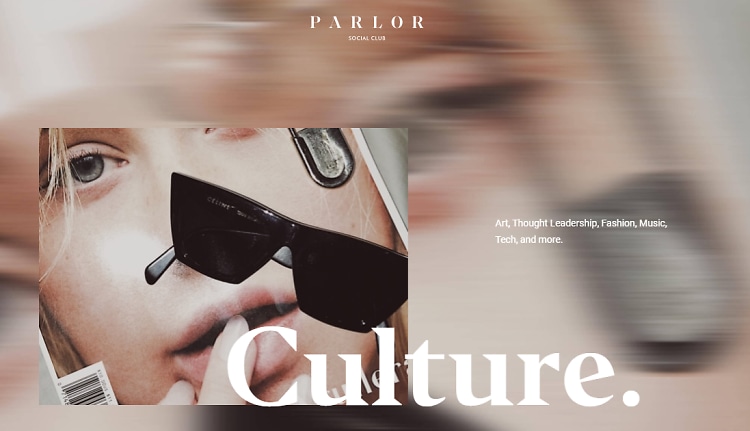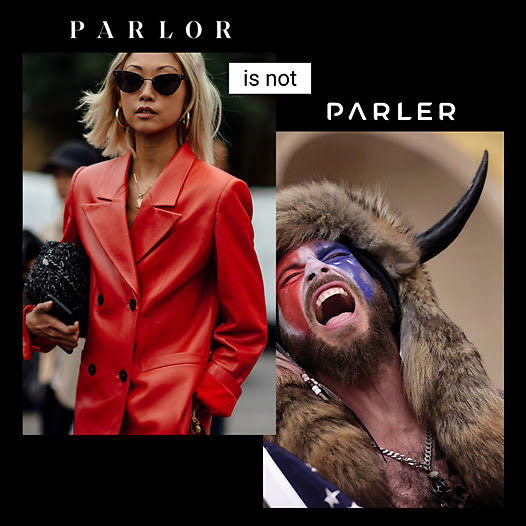
Parlor, Parlor, Parler, Par-lay? Will the real social-networking app please stand up?
In recent weeks, the word, whichever way you spell it, has become ubiquitous thanks to a political power struggle and the debate over "free speech" in the aftermath of the attempted coup at the Capitol. Parler, the social site alternative to Facebook and Twitter, which has become a go-to for conservatives - and might be a Russian PSYOP (lol) - is still not quite back online after getting kicked off its webhosting service for inciting violence. Founded in 2018, it was meant to refer to the French phrase meaning "to speak," and thus originally pronounced PAR-lay, though its right-wing adopters widely began using its English pronunciation, which sounds like "Parlor" (a room typically used for conversation, as it were).
Now, when you look up Parler on the Apple app store, your search results are prefaced with "Did you mean parlor?" The ban has caused an obscure chatting platform, named Parlor, to shoot to the top of the list. The "social talking app" claims to have been around for 10 years and seems very meet-local-singles-in-your-area-ish. Yeah, pass.

But another app, called "Parlor Social Club," has also risen in the ranks. This one is a bit more interesting.
Marketing itself as a digital membership club, its website reads: "Parlor is a new way to socialize. Members enjoy a thoughtfully-curated calendar of online and offline events and the ability to connect with each other through our mobile app. Parlor members come from a variety of backgrounds creating a balanced mix of creatives, professionals and tastemakers."
It advertises social and professional networking in a range of high-end cultural landscapes, like art, music, fashion, and wellness. You submit an application to join and a premium membership costs $19 a month.
Its Instagram account boasts a repetitive series of "aesthetic" photos (primarily pulled from the internet), has a little over 5,000 followers, and made its debut with a cryptic post in 2019. Seeing as it's based in New York City and is clearly aimed at a certain cosmopolitan demographic, it's no wonder that the so-called social club wants to differentiate itself from the alt-right platform of the same (but different) name. This has led to an admittedly hilarious marketing campaign, which I came across as a sponsored ad on Facebook:

(The comments on the ad, from angry "patriots," were probably not what they were expecting, but I really must applaud the idea.)
But now that we've established that Parlor is not Parler, what, exactly, is Parlor? This opens up a whole new can of worms.
Social scene veterans may recall The Parlor Club, an exclusive members-only situation which elicited buzz from 2009 until its official opening in 2011. Like Soho House, Norwood, or CORE: Club, it featured a physical clubhouse space, complete with on-site restaurant (which notably served complimentary dinners to members) and nightclub-y programming after dark. In 2014, we wrote that membership cost $1,500 annually with a $250 quarterly beverage minimum. Honestly, not a bad deal.

The location at 286 Spring Street eventually shuttered and Parlor appears to have had a brief stint in partnership with Omar's La Ranita in the West Village, which closed in 2018. Then some radio silence and now, voilà, the Parlor social app.
The question of whether or not the two are related obviously popped into my head when perusing its website. It makes no reference to it being a new iteration of the former hot spot, but, weirdly enough, it does feature a slightly paraphrased pull quote from a Barron's article about the OG Parlor: "We are entering a new golden age of social clubs."
I reached out via email to ask, but then began my own research.
As suspected, old listings of the former Parlor website now redirect to Parlor.Social, the new platform. Finally, I found confirmation on the LinkedIn profile of Jan Cieslikiewicz, a Polish-born photographer and Harvard grad who has been involved in venture capital and lists both versions of Parlor on his resume, although they do appear to be separate entities. According to his profile, Cieslikiewicz was a founding partner of Parlor Members Club (2010-2017) and the co-founder of Parlor Social Club (2018-Present). Frederick Ghartey, another owner, also lists both ventures on his LinkedIn.
So, mystery semi-solved: Parlor isn't Parler but it is related to Parlor. While I still can't tell you whether or not signing up is worth it (I haven't been accepted yet), I can almost guarantee that nobody will be talking about overthrowing the government.
[Photos via Parlor.Social, Yelp]


.jpg)
.jpg)



.jpg)
.jpg)
.jpg)



.jpg)
.jpg)